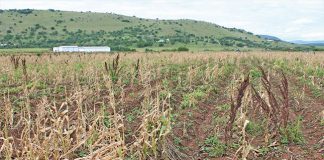The purpose of the meeting was to discuss the ongoing problem of marauding dogs attacking farmers’ sheep. “Dogs are one of our biggest problems. Sheep are being mauled to death and in most cases there are also sheep missing after such an incident,” said Mike Cloete, chairperson of the Indwe Farmers’ Association. “Farmers feel that the crime scenes are not being investigated by the police and evidence is not being gathered.”
Cloete cites the absence of by-laws that deal with the issue of feral dogs as the main problem and lays the blame on Emalahleni Municipality. This is why Malibongwe Nziweni, unit administrator of Indwe in the Emalahleni Municipality, organised the meeting between farmers, municipal officials and councillors, the SPCA, the Department of Environmental Affairs and other role-players to discuss promulgating the proposed by-laws.
Police concerns
At the meeting the police also raised some issues that concerned them. “Farmers must please tattoo their sheep and brand their cattle. Fences need to be checked regularly. If there are incidents of dogs attacking flocks of sheep or fences being cut, farmers are requested to report them immediately to the police.”
The message from the local police was clear. “For effective policing, especially in cases like these when farmers lose sheep to feral dogs, the police need the municipality to draw up by-laws.” Politicians reacted positively. “We have heard the cry of the community. That is why the Emalahleni Municipality has been working hard to promulgate the new by-laws,” said Nziweni. However Dallas Bradfield, a farmer from Dordrecht, expressed his concern at the time frame in which these by-laws would be implemented.
Lomwabo Khowa, communication officer for the Emalahleni Municipality, explained the process of promulgating by-laws. “The standing committee approved the initial set of by-laws in June. On 13 July 2007 the councillors will view and approve these by-laws. Thereafter there is a 21-day period when the municipal officials will visit the 16 wards of the Emalahleni Municipality to obtain public comment. Copies of the by-laws will also be available at each of the municipal offices for public comment.
Changes will then be incorporated and the final draft advertised. If no further objections are received, final approval is then given by the council at a special meeting. Thereafter the by-laws become binding,” said Khowa. New pounds in the Emalahleni Municipality will come into operation once the by-laws are approved. Each pound will have a pound master and each town will have three rangers to implement the by-laws.
Measures to control dogs
“All dogs must be enclosed in the yard or tied up on the premises of their owner. Fence netting should be used if required and the skirt of the netting should be buried or rock-packed to prevent dogs digging under the fence,” suggested Tim de Jongh from the Department of Environmental Affairs.
“No household should be allowed more than two dogs. Should any household want more than two dogs, or wish to breed with their dogs, they should apply for a special permit for which they will be levied a stipulated amount,” De Jongh explained. “The municipality should have a programme in place that subsidises and encourages the practice of neutering and spaying dogs when they are young. Maybe veterinary students doing their practical year could work in this programme,” said De Jongh.
Vonny Strachan of the SPCA said the Cacadu District Municipality had an agreement with the SPCA to provide funds for neutering animals, provided the SPCA neutered the required number each month. Farmers in the area are waiting expectantly, hoping that the implementation of these by-laws will bring an end to the astronomical livestock losses they have suffered.












